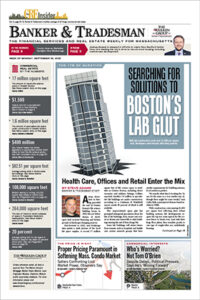
New federal data shows Massachusetts issued building permits for as many homes last year as a single mid-sized Florida city did in the last two, new data show. iStock photo
Boston and other progressive cities and states are struggling to produce new homes, even as red states boom.
Just call it a case of the blue state housing blues.
Construction of new apartments and homes has all but ground to a halt in Boston while statewide, numbers are just starting to modestly bounce back after a big tumble following the interest rate shock of 2022 and 2023, federal and city housing data shows.
Boston Mayor Michelle Wu has blamed the collapse on interest rates and construction costs. And certainly, these factors have weighed on housing development across the country.
Yet that doesn’t explain why some red states and cities have come roaring back, while others, despite also seeing a decline, continue to churn out housing at rates that Boston and many other blue cities and states would die for.
Housing construction has bounced back – and bounced back big – in Austin, a fellow university town in one of the reddest states in the country, while rents there have plunged by 22 percent, according to Bloomberg News.
City officials slashed approval times for new housing projects and loosened restrictions on height and the number of units that can be built on a single lot, as Boston leaders themselves heard when Austin city councilors and mayoral staffers spoke to the City Council last fall.
Developers rolled out an astounding 50,000 new apartments, condominiums and homes in Austin over the course of 2023 and 2024.
Some landlords are now resorting to all sorts of enticements to lure new tenants to empty apartments, including free rent for one or two months, the piece notes.
By contrast, local blue bastions like Boston, Cambridge and Somerville always talk a great talk when it comes to the need for affordable housing.
But when it comes to getting actual housing built, well, it’s been a different story.
Last year, Boston issued building permits for just a little over 1,700 units, a 50 percent decline from 2022 and the lowest overall total since at least 2018, city records show.
By last fall, new residential construction was down to a trickle in the city, with just 35 new units in November and another 60 in December.
‘Busy as Blazes’ in Other States
At the state level, the picture doesn’t look much better, either.
The roughly 15,000 new homes Massachusetts permitted last year, per federal data, is about what Jacksonville, a single Florida city, has built over the past two years.
The contrast between lagging blue cities and states and their red counterparts isn’t lost on local contractors and developers.
In fact, a number of them, like John Moriarty, president of Winchester-based contractor, John Moriarty & Associates, are now busy building housing in other states and regions where costs are lower and the regulatory burden is much lighter.

Scott Van Voorhis
That means more predictability and getting approvals for projects in months instead of years, said Moriarty, who for the first time in a long time has no major projects gearing up to start in the Boston area.
“We are busy as blazes in Florida,” with Northern Virginia “busy as well,” Moriarty told me in an interview for my newsletter, Contrarian Boston.
Still, if it’s any consolation to the Wu administration, another progressive bastion is actually doing worse than Boston when it comes to producing housing.
That would be San Francisco, which issued building permits for only 750 new housing units last year, federal stats show.
Scott Van Voorhis is Banker & Tradesman’s columnist and publisher of the Contrarian Boston newsletter; opinions expressed are his own. He may be reached at sbvanvoorhis@hotmail.com.






